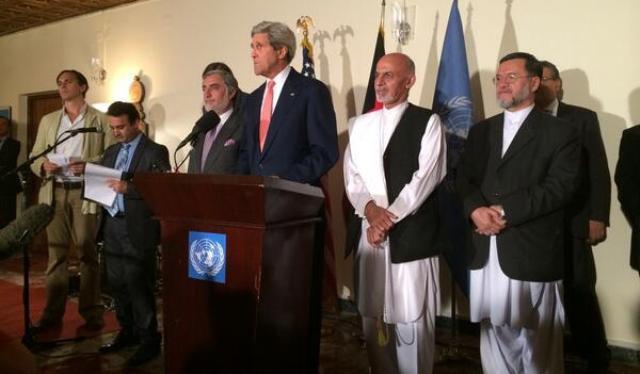KABUL, which inaugurated its new president on Monday.
Ahead of the inauguration of President Ashraf Ghani, Kerry wrote in the Washington Post on Saturday that it would mark “the first democratic transfer of power in Afghanistan’s history and the first peaceful leadership transition in more than 40 years”.
Ghani, he said, would “work in tandem with the country’s first-ever chief executive officer”, Abdullah Abdullah, after the “two statesmen … came together to form a government of national unity following a very contentious election”.
Kerry wrote: “This moment was not easily arrived at, and it belongs primarily to the millions who courageously went to the polls to vote in April and June in defiance of Taliban threats. The voters’ message was unequivocal: No improvised explosive device and no suicide bomber would stand in the way of their country’s democratic future.”
He noted that both Ghani and Abdullah had committed to signing the necessary agreement for US troops to remain in the country beyond the end of this year — the new Afghan government was built on “a common vision for economic reform, honest government, security and peace”.
The Secretary of State also made a wry comparison between the bipartisan co-operation underpinning the new Afghan government and the polarised state of American domestic politics.
“For those at home who are quick to question Afghanistan’s democracy,” he wrote, “they might ask themselves whether they believe that – in less than 90 days – two US presidential candidates could transform a bitter and hotly contested campaign into a unity government with an exceptionally strong mandate to govern.”
Referring to the contested presidential vote which eventually returned George W Bush to power over the Democratic nominee Al Gore, he added: “Flipping the pages of our own history back to the 2000 election, the answer might provoke some humility or at least some perspective on how difficult it can be.”
ma
Views: 0









GET IN TOUCH
NEWSLETTER
SUGGEST A STORY
PAJHWOK MOBILE APP